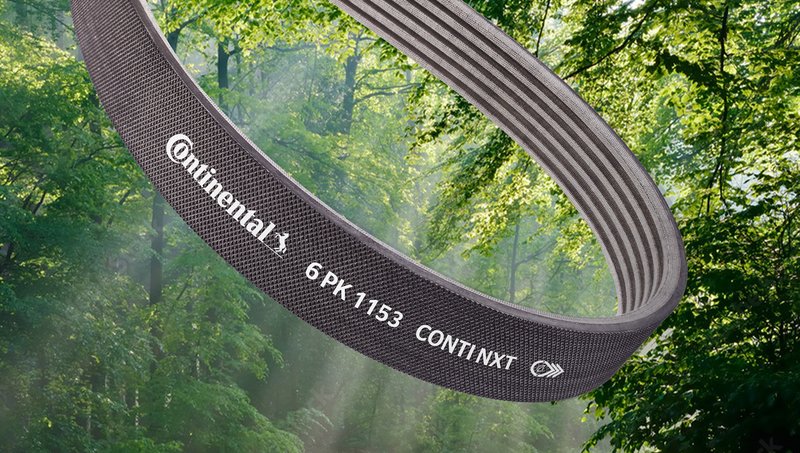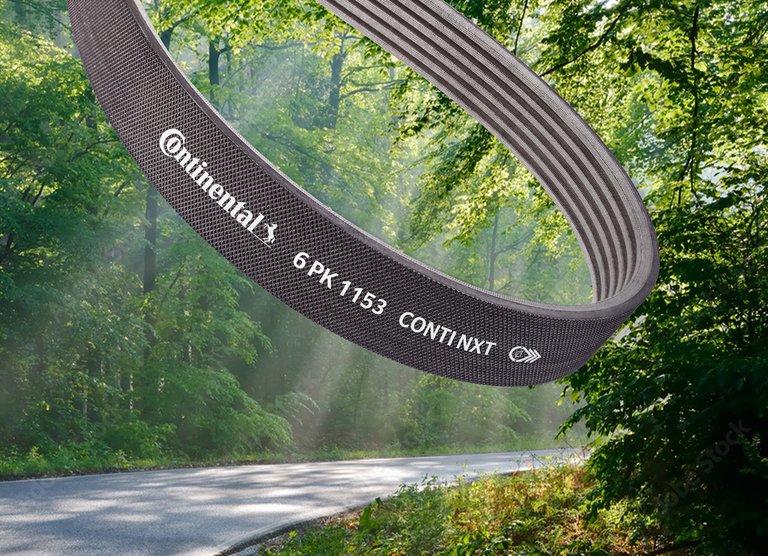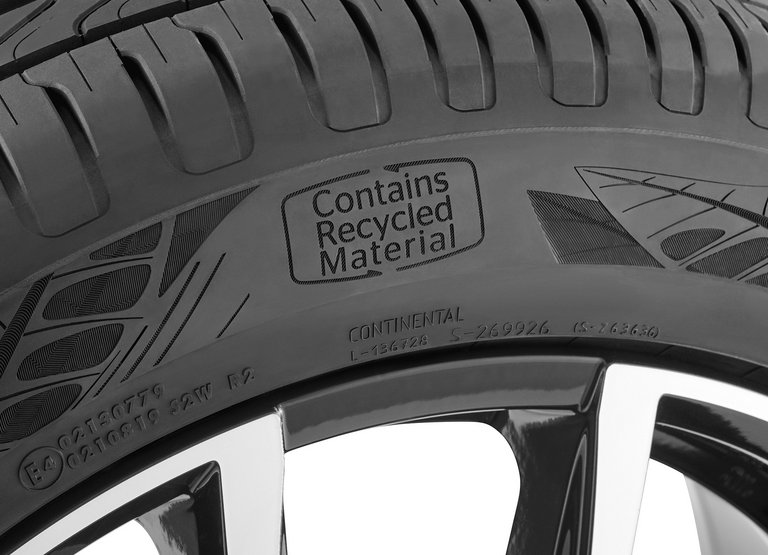More Recycling, Less Emissions: Continental Focuses on Sustainability in the Aftermarket Business
- World innovation: CONTI NXT Multi V-belts with almost two thirds sustainable materials
- Premiere of the ATE New Original product line for next-generation brake systems: new brake discs and pads for electric vehicles and reduced particulate emissions in the future, sustainably produced brake fluid ATE SecuBrake
- Proportion of recycled, recyclable and renewable raw materials in the spare and wear parts program is growing
- Enno Straten, Head of Automotive Aftermarket: "We support the transition to sustainable mobility with our OEM know-how and present more environmentally friendly products – without sacrificing performance."
Frankfurt, Germany, September 10, 2024. At this year’s Automechanika, Continental will present several sustainable products that set new standards in terms of environmental compatibility and climate protection. The ATE New Original product line from the premium brake brand ATE will make its debut and be showcased along with the CONTI NXT Multi V-belt series. ATE New Original products are designed to meet the higher demands of new and future brake generations and are at the center of developments to comply with the particulate matter limits according to the Euro 7 standard. Two ATE New Original products will be showcased at Automechanika: the newly developed friction pairings for disc brakes and the sustainably produced brake fluid SecuBrake. Continental will also present the sustainable UltraContact NXT tire for the first time as a series production tire with up to 65 percent renewable, recycled, and mass-balance-certified materials. This increases Continental’s share of recycled, recyclable, and renewable raw materials in its spare and wear parts program and reduces emissions, thereby ensuring that workshop partners and customers can more easily transition to more sustainable mobility.
Sustainability gaining in importance
Sustainability is becoming increasingly important in the automotive aftermarket, as shown by the first Europe-wide sustainability study recently published by Continental. However, to enable workshops to make solid profits, relevant environmentally friendly products are a must. “Whether it is electromobility, environmentally friendly materials, or sustainably produced spare parts, the issue of sustainability is gaining in importance,” says Enno Straten, Head of the Automotive Aftermarket business segment at Continental. "We support this transition to sustainable mobility with our OEM know-how and present more environmentally friendly products – all without sacrificing performance. These products help to anchor sustainability more firmly in workshops and among workshop customers."
Multi V-belt – alternative materials reduce the environmental footprint
At Automechanika, Continental will showcase its CONTI NXT Multi V-belt from the ContiTech group sector, showing that in future it will also be possible to power auxiliary units in cars using renewable raw materials and recycled materials. CONTI NXT is the world’s first Multi V-belt to use tension cords made from recycled PET bottles, a textile cover layer made from organic fibers as well as rubber certified according to the mass balance standard and recycled carbon black. Overall, the belt is made of almost two-thirds of more sustainable materials compared to conventional V-ribbed belts. The CONTI NXT will be available in the spring of 2025, in addition to the conventional Multi V-belts of the Continental brand – initially in 25 different types for the most common repair needs.
"We are very proud of this pioneering achievement in the passenger car aftermarket," says Rolf Sudmann, who is responsible for the spare parts business for cars and commercial vehicles in the ContiTech Industrial Solutions EMEA business area. "At ContiTech, we have the material expertise to make belt drive components and other rubber-based products progressively more sustainable, without compromising on performance and durability, as we are now demonstrating with the CONTI NXT Multi V-belts. We are closely monitoring the demand for spare parts made from recycled or renewable materials, and we firmly believe that we can offer more sustainable alternatives for other spare parts."
Multi V-belts for passenger cars usually consist of four layers: a polyester tension cord, a rubber layer, a belt backing also made of rubber and a textile cover layer. Continental has now succeeded in using polyester made from recycled plastic bottles for the tension cord. Also, the ContiTech material experts were able to replace the synthetic fiber cover layer of most Multi V-belts with a cover layer made of cellulose-based lyocell fibers. The fibers are produced in an environmentally friendly and closed process; the cellulose used comes from sustainable forestry. Furthermore, recycled carbon black and rubber certified according to the mass-balance standard are also used for the rubber compound.
ATE New Original – focus on technological change and sustainability
The mission of the new ATE New Original product line is to combine optimal performance with maximum sustainability. It supports workshops in positioning themselves as service partners for brake systems, electric drives and sustainability. ATE New Original complements the ATE Original line. "We will bundle all our products for next-generation brake systems under the ATE New Original product line," says Straten. “This not only underscores the premium claim that we have established as a brake specialist with well over 100 years of experience. It also reaffirms the pioneering spirit that has always distinguished the ATE brand, showing that we are well prepared for any future challenges in workshops.”
The ATE New Original product offering starts with friction pairings for disc brakes that are tailored to the higher requirements of electromobility. The brake disc and pad are perfectly matched, and designed to offer the optimal combination of longevity, braking performance, comfort, and sustainability. The brake pads are also copper-free in compliance with the US Better Brake Law standard. ATE will launch friction brake pairings for the VW ID.3 and ID.4 models, the Tesla Model S, the Cupra Born and the Polestar 2 in the second half of 2025. The product range will be further expanded during the year. This will provide dealers and workshops with a product range that is perfectly tailored to the growing number of electric vehicles. The novel coating concepts for brake discs and innovative friction mixtures are at the center of developments to comply with the particulate matter limits according to the Euro 7 standard.
ATE SecuBrake – sustainably produced brake fluid with no hazardous substances
The SecuBrake brake fluid is also part of the ATE New Original product line. It exceeds the requirements for DOT 4 brake fluids and is also suitable for electric vehicles. ATE SecuBrake is sustainably produced through the ISCC PLUS certified mass-balance manufacturing process using mostly renewable raw materials. This results in a significantly improved CO2 footprint compared to conventional brake fluids. ATE SecuBrake also contains no borate, eliminating the need for hazardous substance labeling. This simplifies handling in the workshop and makes storage in a hazardous materials warehouse unnecessary.
Tires made of 65 percent renewable and recyclable raw materials
More environmental protection and sustainability, also in the world of tires: In Frankfurt, Continental will showcase the first series tire with a very high proportion of sustainable materials. The UltraContact NXT contains up to 65 percent renewable, recycled, and mass-balance-certified materials, combining a high level of sustainability with maximum safety and performance. All 19 dimensions carry the highest rating in the EU tire label classifications (“A”) for rolling resistance, wet braking and external noise.

Alena Liebram
Media Spokesperson Automotive Aftermarket, Continental Engineering Services and Technology Organization
Continental Automotive




